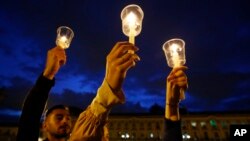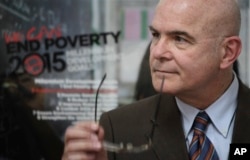Human rights activists in Colombia say they are being gunned down by hitmen who can be hired for as little as $100, a top United Nations official said Monday, urging the government to combat a rise in murders.
A peace deal in Colombia signed two years ago that ended the nation's half-century civil war has led to a 40 percent decline in the overall murder rate, but killings of activists have risen, Michel Forst, the U.N. special rapporteur on human rights defenders said.
According to a July report by British-based campaign group, Global Witness, nearly four land and environmental activists were killed each week last year, in the deadliest year on record, with Latin America faring the worst.
"In rural areas, where the absence of the state is combined with a large presence of organized and illegal armed groups, men and women (human rights) defenders are an easy target for those who see in them or in their human rights agenda an obstacle to their interests," Forst said in a statement after a 10-day visit to Colombia.
"I was surprised to learn that for 100 dollars you can 'get away with it' or at least hire a hitman," he said.
Activists working on human rights and land rights, those defending LGBT+ rights, and community leaders from Afro-Colombian and indigenous groups are most at risk, Forst said.
"I was really appalled by what I heard from them," Forst, who met with more than 200 activists across Colombia, told reporters in the capital Bogota.
Mothers gave him photographs of their sons and daughters who have gone missing, and Forst also heard testimonies from activists who had suffered attacks that he described as "the most appalling experience" of his career.
"The situation I see in Colombia is really dramatic," Forst said.
Activists are being gunned down at a rate of one every two days this year in Colombia, according to Indepaz, a Bogota-based think tank.
Forst noted that during his 10-day official visit, four activists had been murdered.
Forst said he was also concerned to hear testimonies from Afro-Colombian activists who claimed attacks on them may have directly or indirectly involved foreign companies operating in Colombia, mainly those from the extractive sector.
The new government of conservative President Ivan Duque has condemned the violence since coming to office in August, pledging more measures and a national action plan to better protect activists.
According to government figures, 213 rights activists have been killed from January 2016 to October 2018.
"I feel a commitment at the highest levels of state," Forst said. "We will see in the months to come if this political will is followed by concrete implementation."






